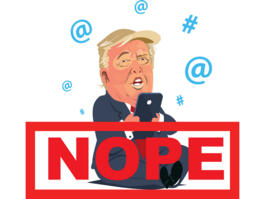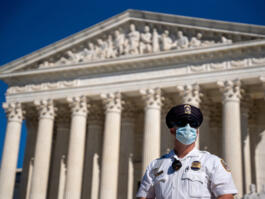Most Voters Suspect COVID-19 Came From Chinese Lab, Support Investigation
A majority of voters think it is likely COVID-19 originated in a Chinese research laboratory and believe a federal investigation of the pandemic’s origin is very important.

A majority of voters think it is likely COVID-19 originated in a Chinese research laboratory and believe a federal investigation of the pandemic’s origin is very important.

A majority of voters support the creation of a commission to investigate the January 6 riot at the U.S. Capitol.

While President Joe Biden urges Congress to spend billions of dollars for new programs, most voters don’t think government spends taxpayer money wisely and want a less active role for government.

A majority of conservative voters say Fox News Channel is their preferred source for TV news, but Newsmax and One America News (OAN) have gained viewers in the past year.

How big is the U.S. national debt? How many Americans don’t have health insurance? What’s the top tax rate? If you watch liberal news media, you’re more likely to get those answers wrong.

In the wake of Hamas rocket attacks on Israel, most voters believe the risk of war in the Middle East has grown.

Fewer than 50 unarmed black suspects were killed by police last year and more people were killed with knives than with so-called “assault weapons,” but viewers of MSNBC and CNN are far more likely than Fox News viewers to get those facts wrong.

Last week’s hacker attack that shut down the Colonial Pipeline has raised concerns about the nation’s petroleum supply, and less than half of voters are confident that the federal government can protect against similar attacks in the future.

Most viewers of MSNBC and CNN believe climate change could doom mankind to extinction within 100 years, and viewers of those networks are also likely to overestimate the amount of global warming that has already occurred.

While the Biden administration has denied that problems at the southern border are a “crisis,” two-thirds of voters disagree and most say that President Joe Biden’s policies are to blame.

After Facebook extended its ban of former President Donald Trump, most voters don’t trust censorship decisions by social media companies, but Democratic voters are the exception to the rule.

In the wake of Facebook’s decision to permanently ban former President Donald Trump from the platform, a majority of voters now favor ending legal protections for social media companies.

It may be that the biggest loser in last year’s election wasn’t a political candidate, but CNN, which has seen its ratings drop precipitously since former President Donald Trump left office in January.

President Joe Biden’s $2 trillion infrastructure plan has support from a majority of voters, but an even larger majority want Biden and Democrats to compromise with congressional Republicans infrastructure spending.

Most voters view domestic terrorism as a greater danger to America than foreign threats, and don’t have much confidence that President Biden can cope with the threat.

An overwhelming majority of American voters oppose government benefits for illegal immigrants, and most believe the availability of such benefits is a magnet that encourages illegals to enter the country.

Friday will mark President Joe Biden’s 100th day in office, but most voters don’t give him high marks at this milestone of his presidency, and many still doubt that Biden won last year’s election fairly.

Nearly half of voters believe America needs stricter gun control laws, but a majority believe stricter enforcement of existing gun laws will do more to reduce violence.

Criticism of police from politicians isn’t improving law enforcement, according to a majority of voters who say anti-police rhetoric makes life more dangerous for cops.

Most voters have an unfavorable impression of Vice President Kamala Harris, and GOP voters in particular doubt she is qualified to become president.